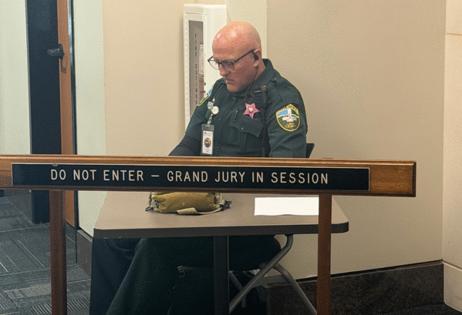The Hope Florida case is before a grand jury. Here's how the process works
Published in News & Features
The criminal investigation related to the Hope Florida Foundation has reached one of the legal system’s most secretive institutions — a grand jury.
Earlier this month, two key figures related to the Hope Florida inquiry appeared at the Leon County courthouse.
Also seen: state Rep. Alex Andrade, who this legislative session questioned Gov. Ron DeSantis’ administration’s direction of $10 million from a Medicaid settlement to the Hope Florida Foundation. Much of that money soon ended up in political committees.
Andrade confirmed that he came to “share my perspective with the grand jury,” but said he couldn’t divulge what was asked or what he said.
That’s largely because of tight rules around grand jury privacy.
Grand juries play important roles in the criminal justice system, but the secrecy surrounding them can make their process difficult to understand. Dave Aronberg, a former Palm Beach County state attorney, joked that grand juries are so secretive he had to “get elected state attorney to get in there.”
Here’s what to know about the state grand jury process.
Who gets called to be on a grand jury?
A grand jury, like its name implies, is larger than a trial jury. In Florida, state statute says a grand jury shall have no fewer than 15 people, and no more than 21.
Being selected for a grand jury is no different than being selected for regular jury duty, though. No prior level of juror experience is needed.
But being part of a grand jury is a much longer time commitment. Those picked for grand juries are impaneled for months and meet periodically throughout that period.
What cases do they look at?
Florida prosecutors generally don’t need to turn to a grand jury to get a criminal charge. Unlike federal grand juries, which are needed for all felonies, state prosecutors only need a grand jury for capital crimes.
Outside of capital crimes, prosecutors use their discretion to decide what cases a grand jury should look at, Aronberg said.
Aronberg said grand juries may be used to handle sensitive cases where a prosecutor may want to “remove any smell of politics.”
In Palm Beach County, for example, Aronberg said they often had grand juries look at cases where police shoot someone.
Grand juries can also do more than indict. Aronberg said grand juries can compile issue-based reports or can “vet” a case for a prosecutor and offer their opinion about whether the case should proceed.
John Fitzgibbons, a Tampa criminal defense attorney and former federal prosecutor, said in rare cases, a grand jury can be used to gauge citizen sentiment, like whether grand jury members think a witness is reliable.
What do hearings look like?
Grand jury hearings are inherently one-sided.
Only the grand jury, a court stenographer, the state attorney or assistant state attorney and witnesses are allowed in. There are no judges.
Florida statute allows an attorney to be present for the witness, but only for “advising and consulting.” The witness’ attorney cannot talk to jurors, make an argument or object to questioning.
State statute also makes clear that a witness doesn’t have a right to have an attorney with them. Federal grand juries do not allow an attorney to be in the room at all, Fitzgibbons said.
“For a lay witness, a grand jury is one of the most dangerous places in the country to be,” Fitzgibbons said. “One false statement is perjury. It’s a place that no defense lawyer likes to have his or her client.”
The jury deliberates in private.
What does a jury need to indict?
To indict someone, the majority of grand jury members must determine there’s probable cause that the person committed the crime.
Probable cause is a low bar. It is the same threshold that law enforcement officers need to arrest someone.
What are the possible outcomes?
A jury can choose to indict by majority vote. They don’t have to indict on every charge a prosecutor may present.
The jury can also issue a report offering its thoughts, meaning prosecutors would then choose what step to take next.
The jury can also return a “no true bill,” which means no indictment should be filed.
Aronberg said that if a grand jury chooses to present a report rather than indict, the prosecutor can still go forward and do it themselves. But, he said, “If you get a ‘no true bill,’ that case is done.”
Aronberg said getting a “no true bill” is rare.
What are critiques of grand juries?
Grand juries have their critics.
In 2006, a Palm Beach County grand jury indicted financier Jeffrey Epstein on a charge of soliciting prostitution, rather than felony sexual assault or other heftier charges.
Records later released from that case show the prosecutor presented the girls molested by Epstein as prostitutes and liars when speaking to the grand jury.
Attorney Spencer Kuvin, who represented one of the girls, said the case didn’t need to go to a grand jury. Kuvin was not in the room at the time and said counsel was not allowed.
The secrecy of the process means Kuvin had no way to know that prosecutors were “tanking their own case in front of the grand jury,” he said.
“There’s no way, without an open proceeding, to check to see what the prosecutors are doing or not doing during the grand jury process,” Kuvin said. “They’re using secrecy as a sword to basically do whatever the heck they want.”
(Epstein years later was arrested by federal agents and charged with one count of sex trafficking of minors and one count of conspiracy to commit sex trafficking of minors. He died in federal detention.)
_____
©2025 Miami Herald. Visit miamiherald.com. Distributed by Tribune Content Agency, LLC.







Comments